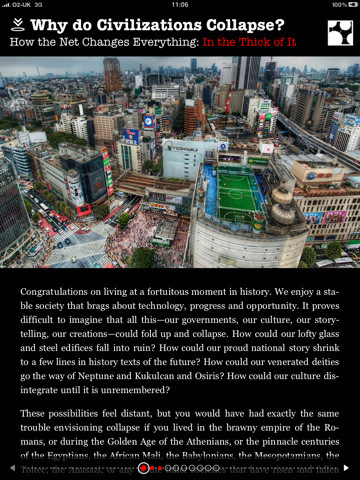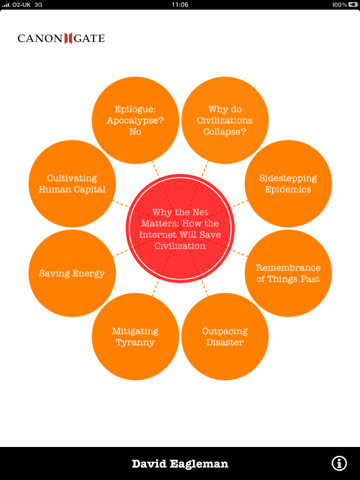Stewart Brand's Blog, page 109
January 10, 2011
Long Now Media Update

WATCH
Rick Prelinger's
"Lost Landscapes of San Francisco, 5″
There is new media available from our monthly series, the Seminars About Long-term Thinking. Stewart Brand's summaries and audio downloads or podcasts of the talks are free to the public; Long Now members can view HD video of the Seminars and comment on them.







January 6, 2011
History of the Sound Bite
The Boston Globe took a look recently at the ever-shrinking sound bite. Digging into the history of the practice, the article argues that the trend towards shorter clips of political speech isn't just older than you'd think – pre-dating television and even radio – but that it's not necessarily an indicator of a shallower political discourse.
According to a new article in the academic journal Journalism Studies by David M. Ryfe and Markus Kemmelmeier, both professors at the University of Nevada, newspaper quotations evolved in much the same way as TV sound bites. By 1916, they found, the average political quotation in a newspaper story had fallen to about half the length of the average quotation in 1892.
According to Daniel Hallin, during the 20 years between the elections of '68 and '88 the average sound bite dropped from forty-three seconds to nine, all well before Twitter! The reason for this isn't a sudden loss of IQ in the media and public discourse, but rather a trend away from publishing lengthy, verbatim excerpts of speeches in preference for analysis and contextualizing of the candidates' claims:
Meanwhile, reporters, influenced by Vietnam and Watergate, were becoming more skeptical and more cynical. It all added up to a more active journalism — which meant, on TV, a journalism that was more interested in exposing and analyzing political image-making than in passively transmitting those images.
Say what you want about what replaced the footage of politicians, but chances are you wouldn't want to let them go on as long as they'd like.
(via Kottke)







January 4, 2011
Presentism in Google Books
Google's new Ngram Viewer is a graphical interface for looking at the frequency of words over time in the several million books scanned into their database. As a publicly mine-able data set, it's huge and ripe for exploration with 500 years' worth of published books spanning several languages. And while it may seem a simple 'just so' kind of information to be able to call up how often a word was used in a particular year, the lives of words can often illuminate historical and cultural trends in surprising ways.
A paper published by researchers who helped develop the project (and summarized by Discover) rounded up a few interesting findings. One delectably recursive tidbit they mentioned was that a search for years (ie. 1865, 1990) can show the historical efforts focused on particular eras and the extent to which those years remain part of present day discussion.
They found a general trend each individual year follows: a spike just before the year followed by a downward trending long tail as it recedes into history. They also, however, noticed a trend amongst that pattern: higher peaks with shorter tails.
When the team looked at the frequency of individual years, they found a consistent pattern. In their own words: "'1951' was rarely discussed until the years immediately preceding 1951. Its frequency soared in 1951, remained high for three years, and then underwent a rapid decay, dropping by half over the next fifteen years." But the shape of these graphs is changing. The peak gets higher with every year and we are forgetting our past with greater speed. The half-life of '1880' was 32 years, but that of '1973' was a mere 10 years.
So, at a cultural level, we can see a developing 'presentism' in which the year we're currently inhabiting takes on great significance, but is more quickly forgotten once it's passed.







December 23, 2010
Long Now Media Update
December 20, 2010
Long Now Media Update

LISTEN
(downloads tab)
Rick Prelinger's
"Lost Landscapes of San Francisco, 5″
There is new media available from our monthly series, the Seminars About Long-term Thinking. Stewart Brand's summaries and audio downloads or podcasts of the talks are free to the public; Long Now members can view HD video of the Seminars and comment on them.







Rick Prelinger, "Lost Landscapes of San Francisco, 5″
Lives of San Francisco
A Summary by Stewart Brand
"You are the soundtrack," Prelinger told the capacity audience at the Herbst Theater, and they responded to his mostly silent archival films by calling out locations, questions, comments, and jokes.
They saw footage of a 1941 Market Street parade of allies—floats representing Malta, Russia, France, Britain—and Kezar Stadium hosting a ferocious mock battle/demonstration of Army cannon, troops, and tanks in 1942 and huge naval ships parked at the waterfront piers in 1945.
Sailors cruised the Barbary Coast in 1914 and amateurs piloted gliders from the vast beach dunes of the Sunset district in 1918 (looking just like the hang-gliders of 90 years later). There was a sky tram at the Cliff House and…
Read the rest of Stewart Brand's Summary here.







December 17, 2010
Where does the data go when the host dies?
In the wake of the crumbling Yahoo! behemoth and the clamor of mass Delicious data dumps, it's worthwhile to stop and ask ourselves just how "archived" is the data that we create and share in these free hosting sites? What kind of promises do these sites make to preserve our information and to care about the hundreds of hours we spend uploading, tagging, and arranging it? In the case of Yahoo! and all of its affiliate sites, none whatsoever.
The funny thing is, we were warned about this over two years ago. In January 2009, the Archive Team said in no uncertain terms, "Please do not use Yahoo or Yahoo-owned sites for any non-retrievable personal data." You may have heard of the Archive Team when they made their herculean effort to download the Geocities sites before Yahoo! closed them down in October of 2009. And it looks like the Archive Team is on the case again. According to their organizer, Jason Scott's tweets yesterday, they are looking at ways to archive Delicious. Let's hope they can.
In the meantime, read their article, "Why Back Up?"
And learn about how you can help. The Archive Team have some excellent projects going to help mitigate some of the nastier effects of the Digital Dark Age, well worth taking a look at them…







December 10, 2010
Philip K. Howard Ticket Info
The Long Now Foundation's monthly
Seminars About Long-term Thinking

Philip K. Howard on "Fixing Broken Government"
TICKETS
Tuesday January 18, 02011 at 7:30pm Cowell Theater at Fort Mason
Long Now Members can reserve 2 seats, join today! • General Tickets $10
About this Seminar:
Philip K. Howard is a conservative who inspires standing ovations from liberal audiences (short example here.) He says that governance in America—from the capitol to the classroom—has achieved near-total dysfunctionality by accumulating so many layers of piecemeal legalisms that the requirements of navigating them has replaced any hope of getting actual justice or effectiveness. Most attempts to fix the problems have made them worse. Howard thinks they can be fixed in a way that restores core functionality.
Howard is the author of Life Without Lawyers (2009) and Death of Common Sense (1994) and is the founder and chair of Common Good, a reform advocacy nonprofit.
Twitter - up to the minute info on tickets and events
Long Now Blog – daily updates on events and ideas
Facebook – stay in touch through our fan page
Long Now Meetups - join one or start your own







December 9, 2010
The Lego Antikythera Mechanism
The Antikythera Mechanism, pulled from the depths of a 1st or 2nd century wreck off the coast of the Greek island of Antikythera, is the oldest known complex scientific calculator. From the moment it was discovered it baffled scientists and historians who wonders what the provenance and purpose of such a machine could have been, especially since a machine of that complexity didn't enter into the historical record for another thousand years.
Hypotheses abounded: it was an orrery, it was a navigational device, it was a method of contact with extraterrestrial beings that left it as a gift for the human race. It has only been over the last fifty years that any headway at all on what the device did has been made, and, to the great disappointment of the alien conspiracists, what it actually does is probably way cooler for such an ancient culture than anything the aliens might have left.
The machine tracks complicated interactions between heavenly bodies, such as eclipses, and does it all with gears and cams and a healthy helping of deep-fried awesome. Sound familiar?
These guys have taken interest in the mechanism to a beautiful, meticulous extreme, and have constructed one out of Lego.
Here is a time lapse of how the video was made, which is just as neat as the actual video:
The Clock of the Long Now is right up there in elegance of design with the Antikythera mechanism, although of course this author is biased. The Greeks, however, have the sheer engineering bad-ass advantage, as they made their machine without PTC Pro Engineer.
For more information about the history of and research on the Antikythera Mechanism, please see the very fine Antikythera Mechanism Research Project, a multi-national collaboration of scientists and historians, which drops mad science from a huge variety of fields.
[Thanks to Boing Boing for the original video link]







December 8, 2010
David Eagleman's new iPad-only book: Why the Net Matters
After his SALT talk for Long Now called Six Easy Steps to Avert the Collapse of Civilization, David Eagleman mentioned his interest in writing an entire book on the subject. Kevin Kelly suggested he make it an iPad book, though they both acknowledged they didn't really know what that meant at the time. Eagleman spent the intervening months working it out and has just announced release of the result:
Why have societies before us collapsed? Do we face the same fate? In his new book, Why the Net Matters, Long Now board member David Eagleman (author of international bestseller Sum) proposes that the invention of the internet averts the major existential threats that brought down those before us. By demonstrating how the internet can contend with epidemics, natural disasters, tyranny, energy depletion and other maladies, Eagleman shows how our existential equations have changed forever.
Why the Net Matters represents a novel step into the future of digital publishing: it is written as an iPad app that introduces a new way to navigate a non-fiction narrative. By offering random-access chapters, interactive 3D figures, and the ability to zoom in and out of the details of the argument, this represents a new direction for digital publishing.
Why the Net Matters is available on the iTunes store.







Stewart Brand's Blog
- Stewart Brand's profile
- 291 followers









